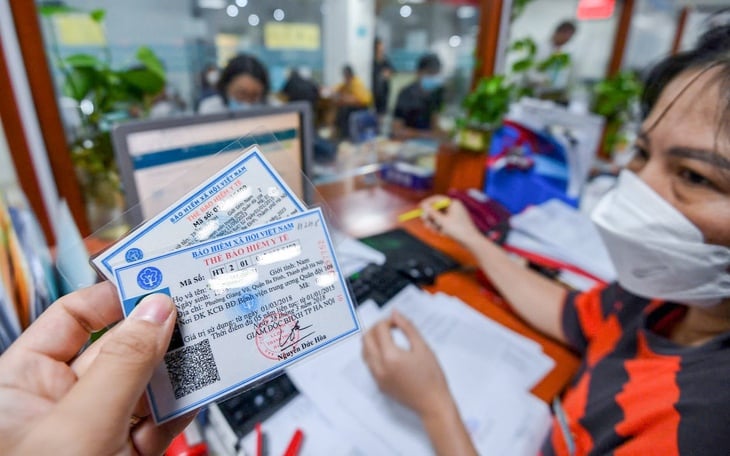
Over 93% of people have health insurance cards. Reducing procedures and improving medical examination and treatment methods will create many conveniences for health insurance patients - Photo: NAM TRAN
According to information from many readers, some hospitals currently only provide patients with chronic diseases with enough medicine for 1 week/session, while others provide enough for 2 or 3 weeks.
After finishing the prescribed course of medication, the patient must return to the hospital, where the patient is clinically examined, may have an electrocardiogram, ultrasound if necessary, the tests are repeated every 3-6 months and a new prescription is issued. If the disease is stable, this causes many difficulties for the patient, especially the elderly, who must rely on their children and grandchildren to move around.
"Dispensing medicine to chronic patients every 2-3 months is more convenient. If they have other illnesses, the patient will go for further examination" - reader Nguyen... commented.
Reader Hoang Dung said that giving medicine to chronic patients every 2 or 3 months would reduce the hospital load. If the disease worsens (during the time of taking the medicine), the patient can go back to the hospital for a check-up at any time.
Responding to Tuoi Tre Online about the reason why some hospitals only provide medicine for patients to use for 1 week, some places 2-3 weeks, and like Xanh Pon Hospital ( Hanoi ) providing enough medicine for 2 months, Mr. Nguyen Duc Hoa, deputy director of Vietnam Social Security, said that the insurance agency does not control the amount of medicine provided at a time.
"However, according to the current regulations of the Ministry of Health , Circular 52, medicine can only be provided to patients for a maximum of 1 month. Some hospitals, such as Xanh Pon Hospital, can provide medicine for longer because the Ministry of Health recently allowed a pilot program.
The doctor will monitor each patient and assign a follow-up visit time, but statistics from Xanh Pon Hospital show that 97% of chronic patients who are given medication every 2 months are safe, without having to change medication, dosage or encounter any abnormalities" - Mr. Hoa assessed.
According to Mr. Hoa, if the cost of the number of visits (in many cases unnecessary) for chronic patients who have been treated stably can be reduced as currently is once a month, or even longer, from 20 days/time to 2 months/time, the Health Insurance Fund will save more and thereby have more resources to increase the quality of services and payments for participants.
For the hospital, Mr. Luong Duc Dung, head of the general planning department of Xanh Pon Hospital, said that increasing the time/prescription for chronic patients helps the hospital reduce pressure on the reception system, registration counter, examination and medication areas, thereby having more time to focus on new cases or patients with severe progression, while patients reduce waiting time.
Mr. Dung also added that Xanh Pon's criteria for selecting patients to receive medication for more than 30 days is that the patient's condition is stable for 3-12 months depending on the disease group, to ensure safe treatment and limit the risk of complications.
Tuoi Tre Online has contacted the Ministry of Health to seek further answers about other measures to reduce the load, as well as whether to expand the model of providing medicine for 2 months instead of 1 month as it is currently doing, and is currently waiting for an answer.
Source: https://tuoitre.vn/cap-thuoc-2-thang-lan-nguoi-benh-do-di-lai-benh-vien-giam-tai-vi-sao-chua-nhieu-noi-thuc-hien-20250514155947106.htm


![[Photo] Top players gather at the 2025 Nhan Dan Newspaper National Table Tennis Championship](https://vphoto.vietnam.vn/thumb/1200x675/vietnam/resource/IMAGE/2025/5/23/9ad5f6f4faf146b08335e5c446edb107)
![[Photo] Anh Hoang - Dinh Duc successfully defended the men's doubles championship of the National Table Tennis Championship of Nhan Dan Newspaper](https://vphoto.vietnam.vn/thumb/1200x675/vietnam/resource/IMAGE/2025/5/23/d6ab3bcac02c49928b38c729d795cac6)






















































































Comment (0)